New Prayer and Liturgy Directory launched by CES and Bishops' Conference
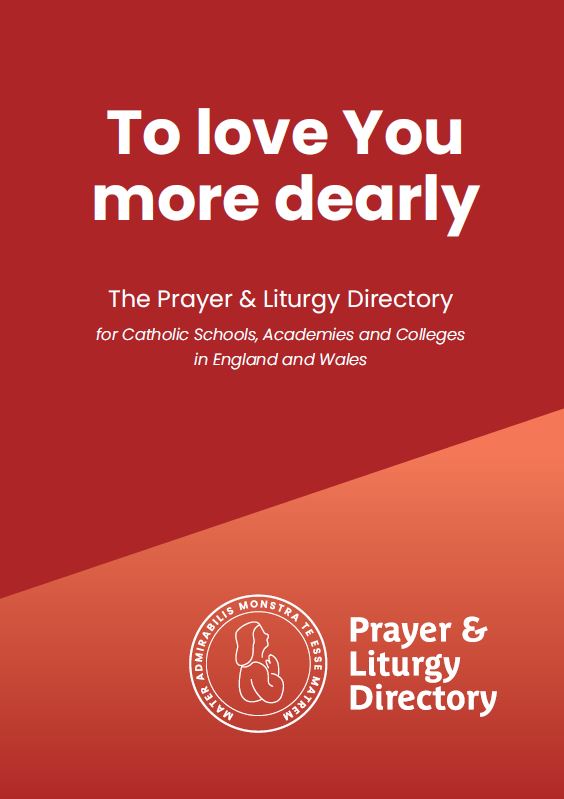
The directory was presented to dioceses on 17 October by a host of speakers including Dr Sue Price, Director of Pastoral Outreach at the Margaret Beaufort Institute of Theology, and its editors Martin Foster, Director of the Liturgy Office for the Bishops’ Conference; and the Revd Professor Peter McGrail, Subject Lead for Theology, Philosophy and Religious Studies at Liverpool Hope University.
Titled To love You more dearly and published by the Bishops’ Conference and the CES, it is the first such document to support prayer and liturgy coordinators, senior leadership teams and governors and others in implementing the understanding of the Catholic Church in prayer and liturgy.
Communal prayer forms a major part of the spiritual life of the school and to pupils’ moral and spiritual development, with participants invited to recognise God’s action in their lives and that of the school. For example, this can include classroom prayer at the beginning or end of the day, and prayer at the start of a staff meeting.
The Directory has been approved by the Bishops' Conference of England and Wales, and was subject to a number of wide-scale consultations with practitioners which helped to shape and develop the text.
In the preface the Most Revd George Stack, Emeritus Archbishop of Cardiff and Chairman of the Department for Christian Life and Worship, and the Rt Revd Marcus Stock, Bishop of Leeds and Chairman of the Department for Education and Formation, write: “In Catholic schools and colleges across England and Wales, teachers and other adult members of the school community have long supported the life of prayer and liturgy within their schools with imagination and dedication.
“We hope that this directory will affirm what is good practice, while also setting a high bar to which all can aspire.”
Topics covered include the use of music; celebrating sacraments; devotions and more. Sections can also be used to provide focused guidance as follows:
- in developing school policies and systems
- in directly planning prayer and liturgy
- as a focus for evaluating practice
- in staff formation
- as reference points for Catholic school inspectors to support their judgments
Part of a series, the document follows on from To know You more clearly, its Religious Education counterpart published earlier this year.
The title of the new Prayer and Liturgy Directory, To love You more dearly, is taken from a prayer by St Richard of Chichester, a Bishop in the 13th century remembered for his generosity to the poor, mercy shown to sinners, and reform of the liturgical life of his diocese.
Supporting resources for schools, based on the directory, are currently being prepared.
To love You more dearly was drafted and edited by experts including Martin Foster, Director of the Liturgy Office for the Bishops’ Conference; the Revd Professor Peter McGrail, Subject Lead for Theology, Philosophy and Religious Studies at Liverpool Hope University; Philip Robinson, Chief Inspector of the Catholic Schools Inspectorate; Catherine Bryan, Deputy Director of the CES; Dr Nancy Walbank, CES Religious Education Adviser; Elaine Arundell, Primary RE Adviser for the Archdiocese of Westminster, and of the National Board of RE Inspectors and Advisers (NBRIA); Matthew Dell, Senior Lecturer in RE at St Mary’s University, and of Association of Teachers of Catholic Religious Education (ATCRE); Deacon Paul Mannings of the Archdiocese of Liverpool, and of NBRIA; Jane Porter of the Association of Catholic Chaplains in Education (ACCE), and Cardinal Newman School, in Luton; and Peter Ward of NBRIA.
Download and read To love You more dearly or order a hard copy from YPD Books
To love You more dearly: new Prayer and Liturgy Directory now available
The new Prayer and Liturgy Directory for Catholic schools, academies and colleges in England and Wales has been published.
Titled To love You more dearly it is available on the CES website to read or download, while hard copies can also be ordered from YPD Books.
Statement on inaccurate London School of Economics research into Catholic primary school admissions
Catholic schools educate a much higher proportion of pupils from the most deprived backgrounds than other schools, according to the Income Deprivation Affecting Children Index (IDACI), with ten times the catchment area of local schools so less reflective of immediate localities.
Free school meals are an inaccurate indicator for example, they continue after after household incomes exceed the threshold. Catholic schools welcome children with SEND, and parents will want to choose the school that is best for their children’s needs.
For a child with an EHCP, it is the local authority, not the school, that makes the decision about which school the child will attend, based solely on the child’s needs.
If parents decides that the local mainstream Catholic school is not the best fit for their child’s particular needs, they might instead opt for another school, such as a Catholic special school or a Catholic school approved for SEN pupils, of which there are 26 in England and Wales.
Catholic schools nationally take 50% more children than other schools from the 10% most deprived areas, and about 25% fewer from the 10% most affluent areas: for IDACI figures see page 53 of the 2022 Census of Catholic schools in England
Columbans launch Biodiversity Matters schools competition
 The Columban Missionaries in Britain announce the launch of their latest Schools Media Competition 2023-2024 which has the title: ‘Biodiversity Matters’. The launch is during the first week of the Season of Creation when Christian communities around the world focus on valuing and protecting God’s creation. And a core aspect of Columban mission is justice, peace and ecology.
The Columban Missionaries in Britain announce the launch of their latest Schools Media Competition 2023-2024 which has the title: ‘Biodiversity Matters’. The launch is during the first week of the Season of Creation when Christian communities around the world focus on valuing and protecting God’s creation. And a core aspect of Columban mission is justice, peace and ecology.
The competition is aimed at students aged between 13-18 years old in Catholic schools who are invited to explore Biodiversity – the richness of life forms on Earth and which humanity relies on for health, food and well-being. It is looking for pieces of writing and images that demonstrate an awareness and understanding of the issue of Biodiversity and highlight people, communities and/or organisations trying to build a sustainable future.
Pope Francis has told us that "because of us, thousands of species will no longer give glory to God ... We have no such right" (Laudato Si' #33)
Columbans worldwide see the devastating impacts of climate change and biodiversity loss on people and the environment as interwoven moral issues in need of prophetic responses. Inspiration for action is drawn from the 2015 teaching document by Pope Francis, Laudato Si'.
In his role as Columban Justice and Peace Education Worker in Britain, James Trewby visits young people in schools and sixth forms and runs workshops, retreats and assemblies to promote justice, peace and the integrity of creation.
He said: “I’m delighted that the Columban Schools Media Competition this year focuses on the theme of Biodiversity. In a world of increasing globalisation and environmental degradation, management of biological diversity is one of the most important and critical challenges facing humankind today. The Columbans are keen to nurture the student voice and provide an opportunity for young people to engage with this issue.”
Encouraging creativity and faith engagement with issues in the world today, this year’s competition welcomes both written and image entries until the closing date of 17 February 2024. Winners will be announced on Columban media on 21 March 2024, the International Day of Forests.
Two separate competitions will be judged, one for students in Britain and one for students in Ireland. Cash prizes will be awarded to the winning entrants and the first prize in Britain is an impressive £500.
High-profile judges from the world of journalism have been secured, including Ruth Gledhill of The Tablet and Jo Siedlecka of Independent Catholic News. Also, Catholic experts on environmental protection and education, including Columban eco-theologian Fr Sean McDonagh and environmentalist Mary Colwell.
Winning entries will be published in the Columbans’ Far East magazine, Vocation for Justice newsletter, Columban websites in Ireland and Britain, Columban social media and in other Catholic media.
Schools will find the Columban Competition website a useful resource. It includes information on the theme, examples of Church work on Biodiversity, Catholic Social Teaching on the theme of Biodiversity and information about inspirational Catholics working on the issue. There are also details on submission of entries and a helpful FAQ page. The website provides material suitable for students, teachers and parents.
This is the seventh annual School’s Media Competition. Past themes have included Migrants, Climate Change, Racism, 21st Century Changemakers and Peace.
Gathering together for Education Sunday
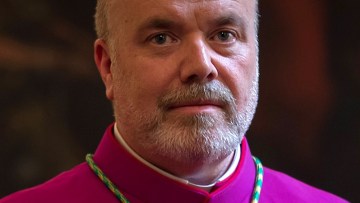 This year, the 10th of September marks the celebration of Education Sunday for the Church in England and Wales.
This year, the 10th of September marks the celebration of Education Sunday for the Church in England and Wales.
In our prayer intentions, we will ask Almighty God to bless all people involved in Catholic education, and to bless the year ahead.
The resources provided to schools and to parishes focus on the promise given by Jesus in St Matthew’s Gospel: Where two or three meet in my name, I shall be there with them (Matthew 18:20).
As students and staff gather for Education Sunday, they can take these words to heart, for our Lord Jesus Christ always keeps His promise: you are gathered together in His name and He is with you as you work, learn, pray, grow and live out your mission.
The great desire of Jesus is to be with us and to invite us to enter into a personal relationship with Him, a relationship of love. When a person knows they are truly loved, a new confidence abounds.
The mission of our Catholic schools, colleges and universities is to provide a holistic education which enables the lives of children and young people to flourish and for them to be formed into the men and women that God the Father has created them to be.
We owe much gratitude to all those who have governed, led, taught and supported the children and young people in our Catholic schools, colleges and universities over the years, and those who continue to create the environments and opportunities for a loving encounter with our Lord Jesus Christ.
Since the 19th century the Catholic Church has become the country’s largest provider of secondary schools and second-largest provider of primary schools. They now outperform national averages for GCSE English, Maths and Religious Education results, while taking in more pupils from the most deprived backgrounds.
On Education Sunday, as we gather in the name of the Lord Jesus and have confidence that He is with us as He promised, let us give thanks to Almighty God for all the ways He has been present to us amidst the joys and sorrows of our life. Let us invite Him to be with us over the coming academic year.
The Right Reverend Marcus Stock MA, STL
Bishop of Leeds
Chairman of the Catholic Education Service
The CES and Ten Ten Resources have produced free, downloadable Education Sunday resources for use by schools and parishes.
Catholic schools and universities need your help
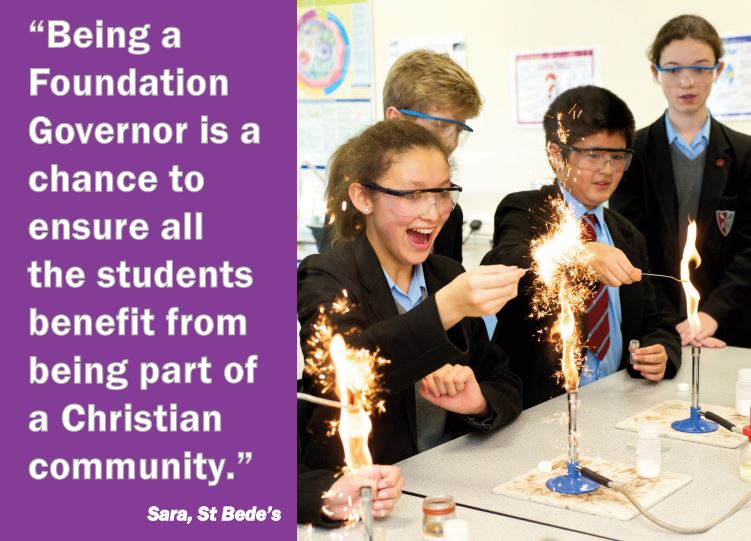
Since the 19th century the Catholic Church has become the country’s largest provider of secondary schools and second-largest of primary schools, along with four universities – but now they need your help.
Educational institutions are generally governed by a body made up of different types of representatives, such as parent governors and teacher governors.
Catholic schools and universities also include foundation governors, who volunteer to ensure the Catholic vision and character of the school is upheld. Appointed on behalf of the Bishop, foundation governors should always form a majority.
Since the pandemic Catholic educational institutions have experienced vacancies for foundation governors, and more are needed to sustain their Catholic ethos and leadership.
Paul Barber, Catholic Education Service Director, said: “As throughout history, Catholics must be prepared to support, promote and defend Catholic education.
“Practising Catholics could make excellent foundation governors, or know someone who might be interested, so please find out about getting involved by contacting your diocese.”
Foundation governors come from all walks of life, bringing a mix of skills, knowledge and experience. Catholic school pupils in England and in Wales are from significantly more diverse ethnic minority backgrounds than the state sector, and governing bodies should reflect this.
The main role of a governing body is at a strategic level, holding leadership to account; overseeing financial performance and setting the budget; managing admissions criteria; and being involved in recruiting to the most senior roles.
Being a foundation governor involves attending on average three full governing body meetings per year as well as serving on a committee focusing on issues such as staff pay, or admissions. Free training is provided by the diocese.
The 2,169 schools, colleges and academies in England and Wales continue to be true to their mission, by educating more pupils from the most deprived backgrounds, and also outperform national GCSE English, Maths and Religious Education averages.
Foundation governors are also needed for Catholic higher education, at Leeds Trinity, Liverpool Hope, Birmingham Newman and St Mary’s universities.
To find out more about becoming a school foundation governor please contact your diocese. If you are interested in becoming a governor at a Catholic university please contact: This email address is being protected from spambots. You need JavaScript enabled to view it.
The ‘muddy boots biologist’ who is the new Vice-Chancellor of Liverpool’s Catholic university
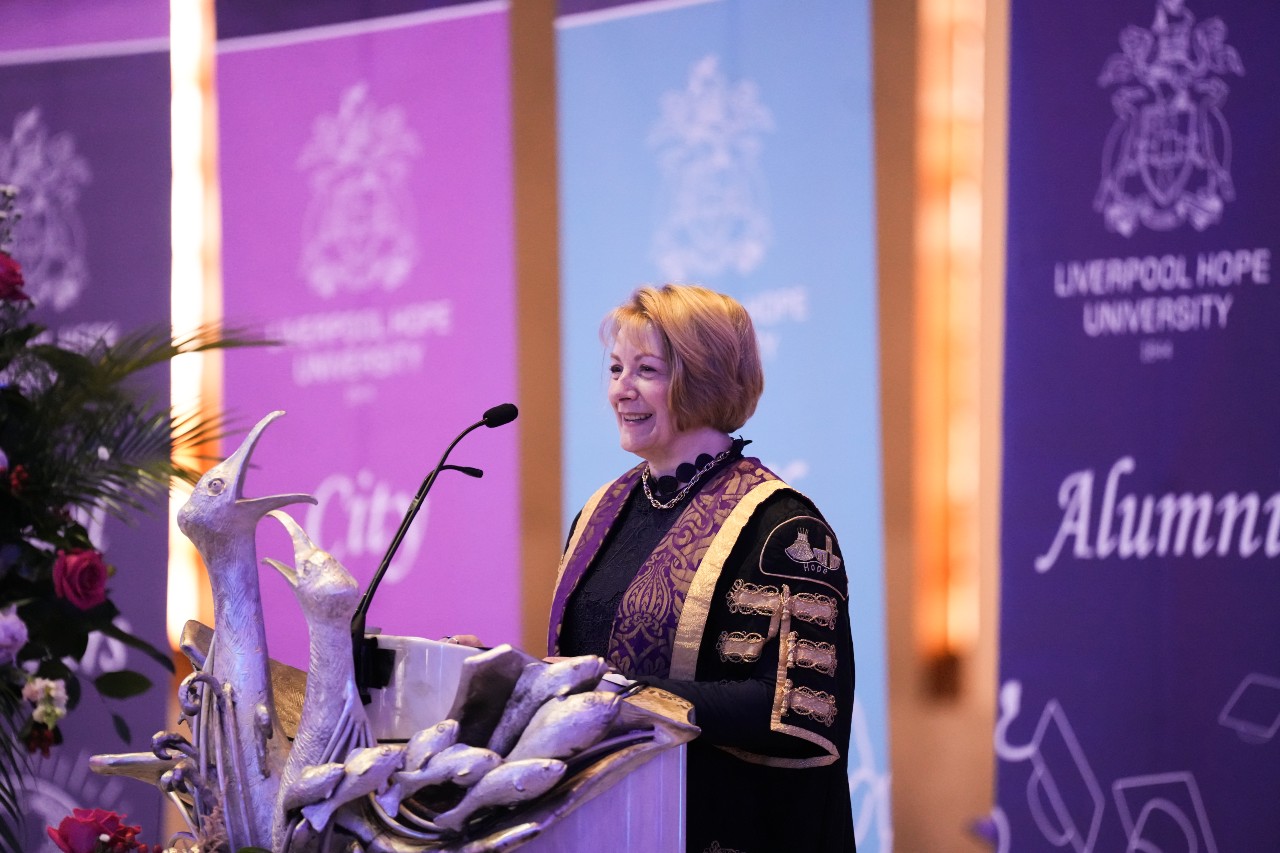 Liverpool Hope is one of four Catholic universities in England, and on 13 July held an inauguration ceremony at the city’s Metropolitan Cathedral for its new Vice-Chancellor, Professor Claire Ozanne.
Liverpool Hope is one of four Catholic universities in England, and on 13 July held an inauguration ceremony at the city’s Metropolitan Cathedral for its new Vice-Chancellor, Professor Claire Ozanne.
With just over 5,000 students, the university is the only such foundation in Europe and the USA where Catholic and Anglican colleges have joined together, and takes its name from Hope Street, which links both of Liverpool’s cathedrals.
Anglican St Katharine’s College was founded in 1844, and Catholic Notre Dame College in 1956, both institutions being created by the Churches in response to the need to train people to educate the poor and disadvantaged. They were joined by Christ’s College of Education, established in 1964 as a centre for Catholic reflection and education.
Professor Ozanne gained her DPhil from Oxford University and her work has focused on habitats influenced by human activities, leading multidisciplinary projects in the UK, Australia, Nigeria, Ethiopia and Guyana.
Formerly the Deputy Director and Provost at the University of London’s School of Oriental and African Studies, and in 2017 seconded to be Principal at Heythrop College, she was also Vice Provost at the University of Roehampton.
Liverpool Hope’s fourth Vice-Chancellor and Rector is a Professor of Ecology, an early interest born out of walks in the countryside with her family, who encouraged her to explore and ask questions about the natural world, as well as an inspirational school biology teacher and university tutor.
Professor Ozanne said: “I was fortunate to be able to bring together my love of trying to understand how systems work and that of the outdoors – I often describe myself as a ‘muddy boots’ biologist.”
Campus environment
She believes Catholic higher education institutions can play a role in implementing Pope Francis’s encyclical Laudato Si’: On Care For Our Common Home in several ways.
This includes integrating two of the Laudato Si’ goals, Cry of the Earth and Cry of the Poor, through teaching and research; providing opportunities for students to engage in practical ways of living in harmony with the Laudato Si’ goals and skills to advocate for them when they graduate; and for universities to minimise their footprint on the planet.
“As a field ecologist I am always aware of the interactions between ecosystems and people in terms of resource needs and conservation,” Professor Ozanne said. “We need to provide solutions to the complex problems of stewarding our planet, and championing climate justice.”
Common ground
The university’s ecumenical ethos is manifested in a connection to qualifications that serve the common good. This is reflected in recognition of the importance of education studies, teaching, health and social sciences, as well as the arts and humanities and their contributions to human flourishing.
Professor Ozanne said: “As vital as STEM subjects are, we need to acknowledge the significance and contribution of theologians, historians, philosophers, writers, composers and many other scholars from the broad range of the arts and humanities subjects.
“We want to enable our students to be ready for the work of the world, as well as the world of work.”
Adapting to challenges
The move to virtual learning during lockdown periods enabled thinking about offering education in different ways, particularly in terms of international, postgraduate education or professional development where there are opportunities for more flexible, hybrid and on-line learning.
There have also been longer-term effects on how research is conducted, with opportunities for new methodologies and international partnerships.
Professor Ozanne said: “All universities are challenged by the increased marketisation of higher education, our Catholic universities in England are relatively small and so not able to take advantage of the economies of scale of large universities.
“Catholic universities in the UK have also to rise to the challenges of increasing secularisation, and a diminishing knowledge base and points of reference related to faith and church in our communities.”
Local support
Liverpool Hope is one of three universities within the world-famous city, and its areas of research strength in the humanities, environmental sustainability, Artificial Intelligence and future technologies complement neighbouring institutions John Moores and the University of Liverpool.
Local and regional Catholic primary, secondary schools and colleges are partners with Liverpool Hope’s School of Education. They support trainee teachers on the university's initial teacher training programmes, providing high quality mentors and rich, formative learning experiences.
The university also works to support the Archbishop’s and Bishops' vision for multi-academy trusts, with representation on director and governing boards, and with research supporting Diaconal training, liturgical and children’s music. It also facilitates a local choir, gardening groups and works with residents’ associations and churches to support community activities, as well as businesses and charities for the improvement of the Liverpool City Region.
Undergraduate and postgraduate international students come for full degrees or a semester abroad experience, some because of its Catholic roots and ecumenical ethos. They also come to the university from global partner institutions with Christian foundations and similar commitments to student-centred education and support.
Professor Ozanne said: “I believe that many choose Liverpool Hope because of its true sense of community.
“We are a university that knows its students by name. We are a smaller university than our fellow higher education institutions and this, combined with our ethos of educating students in the round means that we offer students a personalised educational experience that includes any academic or pastoral support that they need to get the most out of their time at university.”
Equitable future
Ultimately, the new Vice-Chancellor's vision for the university is of a transformational education for students, continuing its excellent research into providing solutions to local and global challenges. It is also as an anchor institution in the North West, contributing to the development of a skilled, future-ready workforce, and for partnerships nationally and internationally to realise a more equitable society.
She said: “At Liverpool Hope I also want to ensure that our values of faith, hope and charity, our strong sense of community and our ethos of educating and developing the whole person are embedded in what we do.”
How do you teach a topic like vocation? New Religious Education resources launched
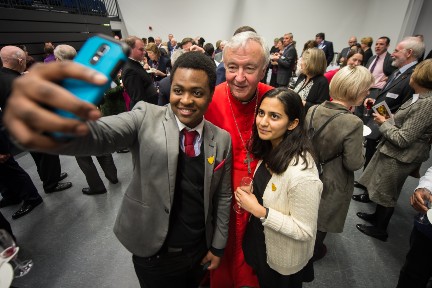 Free new RE resources have been published to help teach sixth form students about the call to holiness.
Free new RE resources have been published to help teach sixth form students about the call to holiness.
The optional Core RE Vocation module has been produced by the National Office for Vocation (NOV) of the Catholic Bishops’ Conference of England and Wales.
The resources include:
a staff handbook of seven structured lessons
prayers
student workbooks
Powerpoint presentations
videos
Lessons are based around the themes of vocation and discernment; the call to serve; marriage; the holy orders of Deacon, Priesthood and Bishop; consecrated religious life; a guest speaker; and assessment.
Archbishop Malcolm McMahon OP, NOV Chair, said: “The Call to Holiness’ is heard at different moments in a person’s life and its response takes different forms. For some it may be a lifelong commitment to religious life or priesthood but for others it may be in the married or single life, in teaching, the caring professions or in the world of law and business, or a combination of these.
"But the ‘Call to Holiness’ is universal and applies to everyone no matter what path in life they choose.”
‘Drawing on our Catholicism helps us to be a good university’: Anthony McClaran, Vice-Chancellor of St Mary’s University, on Catholic higher education
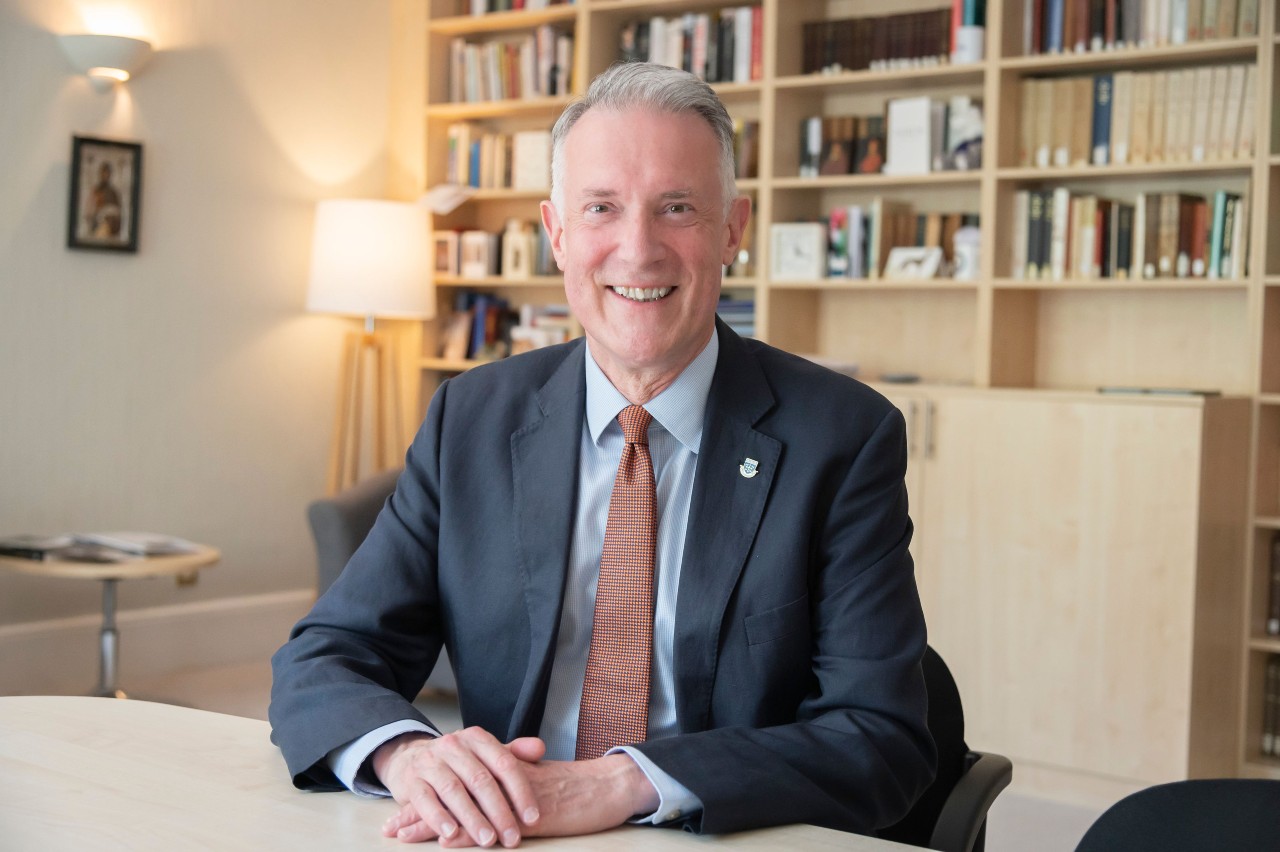 St Mary’s University, in Twickenham, is one of England’s four Catholic higher education institutions and was founded in 1850 by a precursor of the CES.
St Mary’s University, in Twickenham, is one of England’s four Catholic higher education institutions and was founded in 1850 by a precursor of the CES.
Today St Mary’s welcomes 6,000 undergraduate and postgraduate students, including 800 from abroad, across a range of disciplines. It’s also rated as fifth in the country for teaching quality, and in the top ten for overall student experience by national university guides.
Anthony McClaran was appointed Vice-Chancellor in 2020 after serving in higher education leadership roles including as Chief Executive of UCAS; Australia’s Tertiary Education Quality and Standards Agency; the UK’s Quality Assurance Agency; and Pro-Chancellor of the University of Gloucestershire.
In 2021 he was appointed by Pope Francis to AVEPRO, the Holy See’s quality assurance agency for the awarding of ecclesiastical degrees.
As Vice-Chancellor and Chief Executive of St Mary’s, Anthony is answerable to its Board of Governors and is responsible for leadership, strategic direction and the overall coordination of the university to achieve its aims. Part of the role is being its external face, for partners, stakeholders, members of the Church, and more.
He said: “The day-to-day description is incredible variety; it might be a letter from a parent or a message from an alumnus, or we recently hosted the Bishop of Oslo, and the Ukrainian Catholic Bishop - just enormous variety, which is part of the fascination of the job.”
Making connections
Belonging to the broad Catholic family is important for the small but growing Catholic university sector in this country, helping to support international partnerships in research, conferences and student placements. St Mary’s is a member of the International Federation of Catholic Universities, the US-based Association of Catholic Colleges and Universities, and the Federation of European Catholic Universities.
Anthony said: “It's encouraging - you get a strong sense of the universal nature of the Church and can learn lessons from the experiences of colleagues in very different settings. For instance, I attended a development meeting for leaders of Catholic universities with colleagues from South America, Africa, North America, other parts of Europe, and Europeans were in the minority.
“Exposure to the richness and diversity of the Catholic world is really helpful, it gives you a confidence in your mission and in what you're trying to achieve in terms of Catholic higher education.
“We want to be a leading Catholic university, for London and the world, as we're very conscious that being in London we’re in a global city and that has huge benefits in terms of attracting international students. Our Catholic identity is very important as an inclusive identity; we see it as a point of connection with the world not a point of separation.”
Ancient and modern
Despite appearing a relatively new phenomenon, Catholic universities in England stretch back to the mediaeval era, when most of them were established by the papacy or religious orders. Anthony acknowledges the deep history of Catholic education, with the earliest European universities in the service of the Church, and in pursuit of the humane and liberal areas of study. He cites St John Henry Newman as another and more recent influence on Catholic universities, with the Cardinal’s articulation of the idea of a university as a place for the formation of the whole person.
Anthony said: “That means a commitment to a breadth of knowledge, in the context of a very strong commitment to forming the whole person, to seeing higher education not simply in instrumental terms but also in terms of the development of character, and an approach which understands the place of ethics within higher education.
“One of the key developers of artificial intelligence, who's now really worried about the way which that may go, was saying recently that no one's teaching ethics in AI or computing science. I think a Catholic university should have an ethical approach across the curriculum.
“The strength of the tradition we're drawing on is that ethics matter, the virtues matter, character development matters. We prepare our students to be highly employable - and to make a significant impact on the society in which they will be employed.”
This emphasis on ethics is put into practice at the university, which is also home to research initiatives for some of society’s most contemporary and controversial issues. In 2015 the Bakhita Centre for Research on Slavery, Exploitation and Abuse was opened, named after the Sudanese former slave St Josephine Bakhita, which works with government departments and charities. St Mary’s alumnus Sir Mo Farah, a campaigner against human trafficking and modern slavery and a victim of these crimes, was recently made a patron. The Centre for the Art of Dying Well also has its premises on campus, exploring practical matters such as palliative care and support during grief.
Local links
As with England’s other three Catholic universities, Leeds Trinity, Liverpool Hope and Newman, St Mary’s was originally established as a college to train teachers.
Anthony said: “Someone in our institute of education said to me a little while ago that they reckoned about half the heads and deputy heads of Catholic schools in Greater London had been trained at St Mary's. While that’s anecdotal, there are St Mary's teaching graduates widely across the Catholic school system and those links with Catholic schools remain incredibly important for trainee teacher placements.”
The university’s bond with the capital is further born out in membership of the South London Partnership, an alliance of boroughs to promote economic growth and sustainability. Students participate in work placements with local businesses, while St Mary’s also runs the Exchange Theatre in Twickenham on behalf of fellow partnership member Richmond Council, and supports arts festivals in the area.
Thriving Catholicism
Unsurprisingly, there is plenty of Catholic and faith life in the university, from a very active chaplaincy to Masses held twice a day on campus, and there are Catholic, Christian and Islamic student societies. In 2016 the Sisters of Assumption opened a new community at the invitation of St Mary’s, to be a praying presence, and to arrange services such as evening prayer adoration. Pentecost celebrations have also taken place on site organised by members of Loretto HOME, a nearby Christian community where some students are residents.
The university also administers the diaconate programme for dioceses in the South of England, and is home to Mater Ecclesiae College, a Pontifical institute and seminary. Further afield, at the request of the Archbishop of St Andrews and Edinburgh, St Mary’s runs theology courses at the Gillis Centre in the Scottish capital.
Serving students
In conclusion, and as demonstrated by its high-scoring national leaderboard positions, the university is clearly well-regarded by that most critical of audiences, those who choose to study there. For the Vice-Chancellor this is underpinned by belief, and a principle of service for all.
Anthony said: “Drawing on our Catholicism helps us to be a good university, in terms of serving our students, a good university in terms of academic achievement and outcomes. There's a really strong commitment to providing strong support for our students, because we believe that's the way in which they are going to learn most effectively.
“Those qualities are really the gift of a Catholic approach to higher education - not just for Catholics, but for everybody who studies here.”

